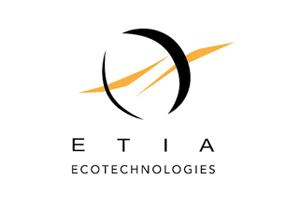
The Plastics2Olefins project brings together leading European players in chemical recycling to push the boundaries of sustainable waste management and olefin production. One of the key partners in this initiative is ETIA, a French engineering group specialized in continuous thermal treatment technologies.
With decades of expertise in pyrolysis, ETIA plays a crucial role in optimizing plastic waste conversion, ensuring that the project achieves its ambitious goals.
Who is ETIA?
ETIA, part of the Norwegian group Vow ASA, is an innovation-driven company that designs and delivers state-of-the-art solutions for processing biomass, food products, and industrial residues. Since its founding, ETIA has been at the forefront of developing sustainable technologies to turn waste into valuable resources.

“One of our flagship innovations, the Biogreen pyrolysis process, has been in commercial operation since 2003, successfully converting biomass, plastics, and waste into energy and useful products,” explains Maïté Huron, R&D Director at ETIA.
While ETIA specializes in land-based applications, its mother company Scanship, also under Vow ASA, extends similar sustainable solutions to the marine industry.
“Together, we are shaping a cleaner future by reducing pollution and pioneering waste-to-energy technologies,” says Mrs. Huron.
ETIA’s Role in Plastics2Olefins
As leader of Work Package 2 (WP2), ETIA is responsible for testing various plastic waste streams at pilot scale. This stage is critical for gathering accurate data that will inform the design and construction of the project’s full-scale demonstration unit. Together with the other WP2 partners (REPSOL, CIEMAT, ACTECO, PREZERO, SCG), ETIA has undertaken a comprehensive evaluation of plastic feedstocks, involving:

- Sorting, drying, shredding, and densifying different plastic types.
- Conducting pyrolysis experiments on both ETIA’s and Repsol’s pilot benches.
- Analyzing product yields and material behaviors to determine the most promising plastic waste streams.
“The insights gained from these tests are instrumental in optimizing the project’s demonstration plant,” notes Mrs. Huron.
In addition to providing crucial data, ETIA is responsible for delivering the pyrolysis reactor for the 500kg/hour capacity demonstration unit, including its feeding system, patented reactor, and char cooling system. This reactor will process 500 kg/hour of waste plastic, converting it into olefins, which will be reintegrated into Repsol’s petrochemical processes.
Current Status and Results
ETIA has been deeply involved in pilot-scale testing, refining its pyrolysis technology to enhance the efficiency of plastic waste conversion. Through WP2, the company and associated partners have achieved significant milestones, including:
- Identifying the most suitable plastic waste streams for high olefin yields.
- Establishing optimal operating conditions for pyrolysis.
- Addressing key challenges in plastic waste preparation, ensuring a streamlined process for the demonstration plant.

Currently, ETIA is collaborating with Repsol and Técnicas Reunidas on the design and implementation of the full-scale pyrolysis reactor. The company also continues to support other work packages by supplying essential data to refine the project’s overall strategy.
A Step Toward Sustainable Plastic Recycling
By leveraging its advanced pyrolysis technology, ETIA is playing a pivotal role in Plastics2Olefins’ mission to transform unsorted plastic waste into valuable raw materials.
“The project’s success will not only contribute to a circular plastic economy but also pave the way for wider adoption of pyrolysis in industrial-scale recycling,” says Mrs. Huron.
With ETIA’s expertise and commitment to sustainability, Plastics2Olefins is well-positioned to deliver groundbreaking solutions in chemical recycling.




